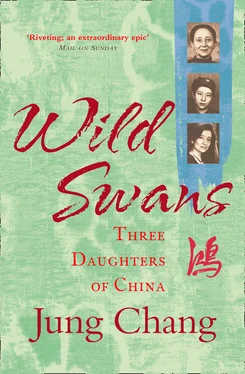Over the next four months, Xue used his police to make sure that the man his faction wanted to see as president, Tsao Kun, would win what was billed as one of China’s first elections. The 804 members of parliament had to be bribed. Xue and General Feng stationed guards on the parliament building and let it be known that there would be a handsome consideration for anyone who voted the right way, which brought many deputies scurrying back from the provinces. By the time everything was ready for the election there were 555 members of parliament in Peking. Four days before the election, after much bargaining, they were each given 5,000 silver yuan, a rather substantial sum. On 5 October 1923, Tsao Kun was elected president of China with 480 votes. Xue was rewarded with promotion to full general. Also promoted were seventeen ‘special advisers’—all favourite mistresses or concubines of various warlords and generals. This episode has entered Chinese history as a notorious example of how an election can be manipulated. People still cite it to argue that democracy will not work in China.
In early summer the following year General Xue visited Yixian. Though it was not a large town, it was strategically important. It was about here that the writ of the Peking government began to run out. Beyond, power was in the hands of the great warlord of the northeast, Chang Tsolin, known as the Old Marshal. Officially, General Xue was on an inspection trip, but he also had some personal interests in the area. In Yixian he owned the main grain stores and the biggest shops, including a pawnshop which doubled as the bank and issued its own money, which circulated in the town and the surrounding area.
For my great-grandfather, this was a once-in-a-lifetime chance, the closest he was ever going to get to a real VIP. He schemed to get himself the job of escorting General Xue, and told his wife he was going to try to marry their daughter off to him. He did not ask his wife for her agreement; he merely informed her. Quite apart from this being the custom of the day, my great-grandfather despised his wife. She wept, but said nothing. He told her she must not breathe a word to their daughter. There was no question of consulting his daughter. Marriage was a transaction, not a matter of feelings. She would be informed when the wedding was arranged.
My great-grandfather knew that his approach to General Xue had to be indirect. An explicit offer of his daughter’s hand would lower her price, and there was also the possibility that he might be turned down. General Xue had to have a chance to see what he was being offered. In those days respectable women could not be introduced to strange men, so Yang had to create an opportunity for General Xue to see his daughter. The encounter had to seem accidental.
In Yixian there was a magnificent 900-year-old Buddhist temple made of precious wood and standing about a hundred feet high. It was set within an elegant precinct, with rows of cypress trees, which covered an area of almost a square mile. Inside was a brightly painted wooden statue of the Buddha, thirty feet high, and the interior of the temple was covered with delicate murals depicting his life. It was an obvious place for Yang to take the visiting VIP. And temples were among the few places women of good families could go on their own.
My grandmother was told to go to the temple on a certain day. To show her reverence for the Buddha, she took perfumed baths and spent long hours meditating in front of burning incense at a little shrine. To pray in the temple she was supposed to be in a state of maximum tranquillity, and to be free of all unsettling emotions. She set off in a rented horse-drawn carriage, accompanied by a maid. She wore a duck-egg-blue jacket, its edges embroidered in gold thread to show off its simple lines, with butterfly buttons up the right-hand side. With this she wore a pleated pink skirt, embroidered all over with tiny flowers. Her long black hair was woven into a single plait. Peeping out at the top was a silk black-green peony, the rarest kind. She wore no makeup, but was richly scented, as was considered appropriate for a visit to a temple. Once inside, she knelt before the giant statue of the Buddha. She kowtowed several times to the wooden image and then remained kneeling before it, her hands clasped in prayer.
As she was praying, her father arrived with General Xue. The two men watched from the dark aisle. My great-grandfather had planned well. The position in which my grandmother was kneeling revealed not only her silk trousers, which were edged in gold like her jacket, but also her tiny feet in their embroidered satin shoes.
When she finished praying, my grandmother kowtowed three times to the Buddha. As she stood up she slightly lost her balance, which was easy to do with bound feet. She reached out to steady herself on her maid’s arm. General Xue and her father had just begun to move forward. She blushed and bent her head, then turned and started to walk away, which was the right thing to do. Her father stepped forward and introduced her to the general. She curtsied, keeping her head lowered all the time.
As was fitting for a man in his position, the general did not say much about the meeting to Yang, who was a rather lowly subordinate, but my great-grandfather could see he was fascinated. The next step was to engineer a more direct encounter. A couple of days later Yang, risking bankruptcy, rented the best theatre in town and put on a local opera, inviting General Xue as the guest of honour. Like most Chinese theatres, it was built around a rectangular space open to the sky, with timber structures on three sides; the fourth side formed the stage, which was completely bare: it had no curtain and no sets. The seating area was more like a café than a theatre in the West. The men sat at tables in the open square, eating, drinking, and talking loudly throughout the performance. To the side, higher up, was the dress circle, where the ladies sat more demurely at smaller tables, with their maids standing behind them. My great-grandfather had arranged things so that his daughter was in a place where General Xue could see her easily.
This time she was much more dressed up than in the temple. She wore a heavily embroidered satin dress and jewellery in her hair. She was also displaying her natural vivacity and energy, laughing and chatting with her women friends. General Xue hardly looked at the stage.
After the show there was a traditional Chinese game called lantern-riddles. This took place in two separate halls, one for the men and one for the women. In each room were dozens of elaborate paper lanterns, stuck on which were a number of riddles in verse. The person who guessed the most answers won a prize. Among the men General Xue was the winner, naturally. Among the women, it was my grandmother.
Yang had now given General Xue a chance to appreciate his daughter’s beauty and her intelligence. The final qualification was artistic talent. Two nights later he invited the general to his house for dinner. It was a clear, warm night, with a full moon—a classic setting for listening to the qin . After dinner, the men sat on the veranda and my grandmother was summoned to play in the courtyard. Sitting under a trellis, with the scent of syringa in the air, her performance enchanted General Xue. Later he was to tell her that her playing that evening in the moonlight had captured his heart. When my mother was born, he gave her the name Bao Qin, which means ‘Precious Zither’.
Before the evening was over he had proposed—not to my grandmother, of course, but to her father. He did not offer marriage, only that my grandmother should become his concubine. But Yang had not expected anything else. The Xue family would have arranged a marriage for the general long before on the basis of social positions. In any case, the Yangs were too humble to provide a wife. But it was expected that a man like General Xue should take concubines. Wives were not for pleasure—that was what concubines were for. Concubines might acquire considerable power, but their social status was quite different from that of a wife. A concubine was a kind of institutionalized mistress, acquired and discarded at will.
Читать дальше












